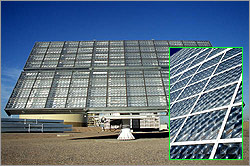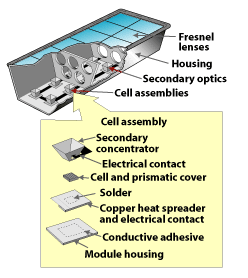It seems to peak around 15 KWhs in the afternoon.
As always, YMMV. I don't know how well Seattle would do with solar, but in Texas it is no problem.
Posted on 01/21/2007 6:41:36 AM PST by Uncledave
Bush came out in favor of the technology and that was the last we ever heard about it. Typical GOP follow-through.
"I hope their supposed economies of scale make this feasible -- they're selling directly against utility retail rates, perhaps there's some margin there for them -- and I also assume since they own the equipment they would pocket some tax credits. It would also create downward pressure on utilities' rates if it gained any traction."
The (traditional) electric companies are pricing themselves right out of business. Here in CT we are staring at an 80% increase in our commercial electric bills in the next 9 months.
I am thinking about writing a letter to this company and seeing what they could do on a commercial level. Obviously they probably do not have the efficiency needed to run a "factory"... but for many small "shops" and offices here in CT this would be a VERY worthwhile thing to look into and an east sell.
A customer of mine just figured out that he'll save money powering his business (30 employees) off of a diesel generator....he'll get ROI in anywhere from 18 to 20 months down the road. The generator cost him $12,000.00
What state/area are you in? Is this available everywhere?
Foldin' is fun!
Lucky you - I'm in NY, and it's 9F here
I'm here in CT, too. Sickening, eh?
It seems to peak around 15 KWhs in the afternoon.
As always, YMMV. I don't know how well Seattle would do with solar, but in Texas it is no problem.
http://www1.eere.energy.gov/solar/concentrator_systems.html


Fuel cells are not a source of power. The fuel a fuel cell uses is the source of power. The fuel cell is an alternative to an engine combined with a generator.
If using hydrogen as the fuel, fuel cells can be considered a method of storing power, an alternative to batteries. In this case, using electricity to convert water to hydrogen is analogous to using electricity to charge the battery.
Of course, an internal combustion engine burning hydrogen connected to a generator (Ford has one available today), would be the exact same model.
How about superceeding laws by the feds stating that solar pannels can not be prohibited by any HOA or local codes.
The way I understand it. As long as there is sun shine the panels provide electricity to the home. You remain connected to your current provider for night time use.
There is a switching mechanism I have seen in homes which have generator back up systems. All the switching is done automatically.
If the panels provide more electricity than the home is demanding, the power co. must purchase the excess.
Feel free to correct me.
Cogeneration works because he gets the waste heat from the generator. A local "Y" has a cogeneration system. They heat the swimming pool water from waste heat from the Natural Gas generator set.
A welding company uses diesel powered welder/generators and runs the coolant through fancoils to heat their shops.
http://www.aegisenergyservices.com/
http://www.tecogen.com/cogen.htm
http://www.cogeneration.net/Cogeneration.htm
Yes, but fuel cells can work with a hydrocarbon fuel such as natural gas or gasoline, and various alcohols, as well as hydrogen.
Too many assume "fuel cells"="zero emissions", when in reality "hydrogen fuel"="zero emissions", that is an ordinary automobile internal combustion engine, converted to burn hydrogen, will produce zero emissions.
Likewise, a fuel cell using methane will produce an exaust of carbon dioxide along with water vapor. The exact same byproducts an CNG converted bus or taxi emits.
Certainly, the chemical byproducts produced by the high temperatures of an internal combustion engine do not occur in a fuel cell.
Interesting if they could get enough of the surface areas of roofs, they could in THEORY make a profit selling power back to the grid.
Now here is the question, will the local governments demand to own the solar power potential?
What about coastal areas? What happens when the county or city commisioner can't sell a vote to a condo tower developer because the 80 story condo building will block out the solar generating ability?
There is case law (OLD case law) about solar easements. This means you can't block your neighbor's sunlight.
Up here in the mountains looks isn't a problem and our house is already passive-solar with the entire south-facing side of the house nothing but windows...and we already have a solar hotwater heater installed by the previous owner.
This plan almost sounds too good to be true.
I understood baynative said he/she was already off grid.
Personally, I would prefer to own my own equipment, stayed tied into the grid and not worry about some third asshat party trying to take my money. The future is in Nukes, not solar power. Nuclear energy is the cheapest and cleanest available. We just have to finally get enough of the marxist, communist, green BS and force the government to relax the regulations on building nukes. It is ridiculous that we sit around and take the crap dished out by liberals. When are we going to grow a set and fight back.
The only downside I see is that you are locked into rates for 25 years. Then if there were a significant breakthrough in energy development and electrical costs actually dropped significantly. Big deal - you're out $500 bucks after saving money on your bill for a number of years.
The other downfall is if the rates went so high that the company was losing money buying off grid power for your back up that they went out of business.
Both scenarios seem unlikely.
Another thing this company is counting on are much more efficient appliances and lighting in the future. If a customer is locked in at a fixed $$ per month, there isn't much incentive to upgrade to the higher efficiency appliances.
Your house sounds like it is very cool!
BTTT
The monthly rate is the amount of energy provided by the system, based on your local providers rates.
Disclaimer: Opinions posted on Free Republic are those of the individual posters and do not necessarily represent the opinion of Free Republic or its management. All materials posted herein are protected by copyright law and the exemption for fair use of copyrighted works.